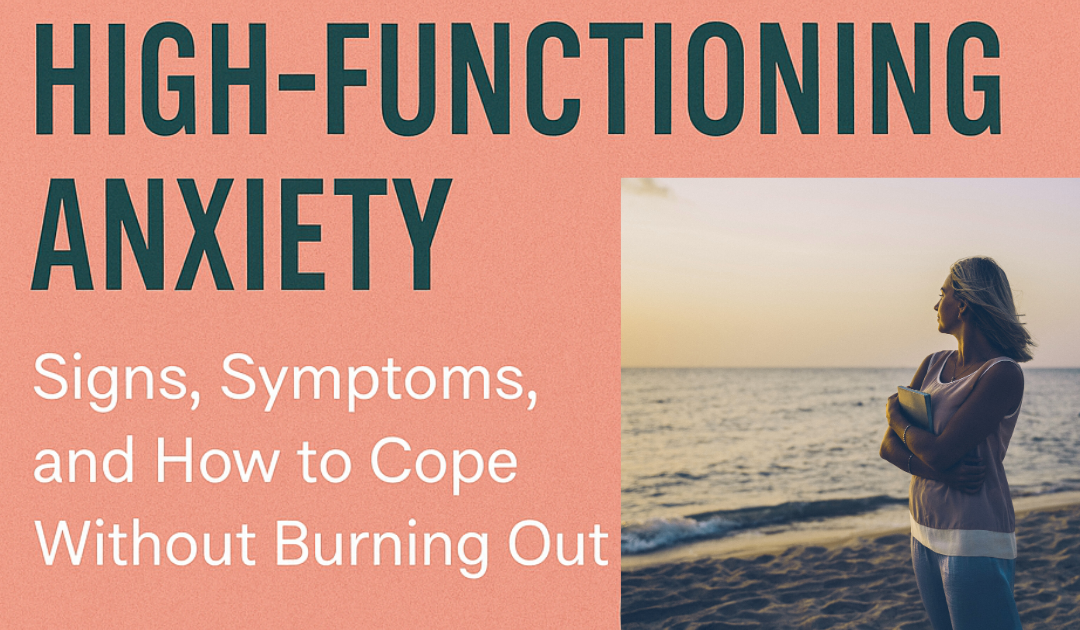In today’s fast-paced world, many high-achieving women are silently battling a hidden struggle: high-functioning anxiety. You look calm, competent, and put-together on the outside—always hitting deadlines, anticipating needs, and showing up for everyone. But on the inside? You’re juggling a constant stream of worry, self-doubt, and exhaustion.
If this sounds familiar, you’re not alone—and you’re not broken. High-functioning anxiety is more common than you think, and there are real, actionable steps you can take to manage it without sacrificing your success or sanity.
In this post, we’ll explore:
- What high-functioning anxiety really is
- Common signs and symptoms (beyond the obvious)
- The silent toll it takes on your body and mind
- Science-backed strategies to cope and thrive
- When to seek help before burnout takes hold
What Is High-Functioning Anxiety?
High-functioning anxiety isn’t a clinical diagnosis, but it describes a very real pattern of behavior and emotion. It refers to people who appear successful and in control externally, while internally they’re struggling with chronic worry, perfectionism, and self-criticism.
Unlike classic anxiety disorders, which might visibly disrupt someone’s ability to function, high-functioning anxiety often goes unnoticed because you’re still performing well—or even over-performing.
But here’s the catch: the constant inner pressure is draining, and without support, it often leads to burnout, depression, or physical symptoms down the line.
Signs and Symptoms of High-Functioning Anxiety
You might have high-functioning anxiety if you:
- Appear calm and competent but feel chronically tense or on edge
- Are driven by perfectionism and an intense fear of failure
- Struggle with overthinking and “what if” scenarios
- Find it hard to relax, even when things are going well
- Say yes to everything and overcommit to avoid disappointing others
- Procrastinate due to fear of not doing things perfectly
- Constantly seek external validation
- Experience racing thoughts, sleep issues, or muscle tension
- Mask your anxiety with humor, control, or people-pleasing
While some of these habits may have helped you succeed, they also keep your nervous system stuck in overdrive. That’s when chronic stress becomes dangerous.
The Hidden Toll of “Keeping It Together”
You might not realize the cost of high-functioning anxiety until your body forces you to stop. Chronic stress and anxiety—especially when bottled up—can lead to:
- Burnout: Emotional and physical exhaustion that can take months to recover from
- Sleep issues: Trouble falling asleep, staying asleep, or waking up wired at 3 a.m.
- Tension headaches or jaw pain
- Digestive problems like IBS, bloating, or nausea
- Irritability or difficulty concentrating
- Feeling detached or like you’re running on autopilot
- Resentment toward people or commitments you once cared about
When high-functioning anxiety is left unaddressed, the body and mind eventually say: “Enough.”
How to Cope Without Burning Out
You don’t need to give up your drive or ambition to find calm. You just need new tools—ones that work with your nervous system instead of against it.
Here are five science-backed strategies to help manage high-functioning anxiety:
- Name It to Tame It
Start by recognizing and naming your anxiety. You’re not “just stressed” or “too sensitive.” You’re likely running on high-alert mode and need support.
Try this: At the end of your workday, write down 3 thoughts that kept looping in your mind. This helps you externalize them and begin to challenge their power.
- Practice Intentional Breathing
Breathing slowly and deeply activates your body’s parasympathetic nervous system, helping you shift out of fight-or-flight mode.
Try this: Inhale for 4 counts, hold for 4, exhale for 6. Repeat 3 times when you feel tension rising.
- Redefine Productivity
Your worth is not tied to your output. Reclaiming your energy means learning to prioritize rest and margin, not just hustle.
Ask: What’s truly urgent today? What can wait? What would I say no to if I trusted myself more?
- Challenge the Inner Critic
Many with high-functioning anxiety have an inner voice that whispers, “Not good enough.” It’s time to question the narrative.
Try this: When you catch a negative thought (“I messed that up”), reframe it with a compassionate truth (“I did my best with what I had.”)
- Use Grounding Affirmations
Affirmations aren’t fluffy—they work when paired with intentional practice and emotion. Here are a few designed for high-functioning anxiety:
- “I can succeed without sacrificing my peace.”
- “I am safe to slow down.”
- “Rest is not weakness—it’s wisdom.”
- “I don’t need to prove my worth; I already have it.”
Write these down, repeat them in the mirror, or record them in a voice memo to listen back when your anxiety spikes.
When to Seek Help
If your anxiety is interfering with sleep, health, relationships, or your ability to feel joy—it’s time to get support.
Working with a therapist, coach, or counselor who understands anxiety can help you:
- Unlearn perfectionist thinking
- Build better emotional regulation tools
- Set boundaries without guilt
- Reconnect with your values
- Recover from burnout
You don’t have to wait until you break down to get support.
Remember: You Can Be Driven and Peaceful
High-functioning anxiety may be common, but it doesn’t have to be your normal.
When you slow down with intention, build new inner beliefs, and learn to respond instead of react, you’ll begin to feel the difference:
Less dread. More calm. Clearer decisions. And the confidence to be fully yourself—even under pressure.
